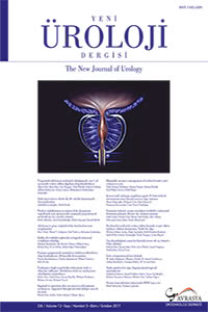Prostat taşları serum prostat spesifik antijen seviyesini artırır mı?
Prostat, Biyopsi, Prostata özgü antijen, Taş, Prostatit
Do the prostatic calculi cause high level of prostate-specific antigen?
Prostate, Biopsy, Prostate-Specific Antigen, Calculi, Prostatitis,
___
- 1.Stamey TA, Yang N, Hay AR et al: Prostate-specific antigen as serum marker for adenocarcinoma of the prostate. N Eng J Med, 317: 909, 1987.
- 2.Sutor, DJ. and Wooley, S : The crystalline composition of prostatic calculi. Br J Urol, 46: 533, 1974.
- 3.Torres RC, Aguilar RJ, Zuluaga GA et al: A crystallographic study of prostate calculi. J Urol, 124: 840, 1980.
- 4.Terris MK, Stamey TA.: Determination of prostate volume by transrectal ultrasound. J Urol, 145: 984, 1991.
- 5.Moon TD, Clejan S, Neal DE, Jr.: Prostate specific antigen and prostatitis. II. PSA production and release kinetics in vitro. Prostate, 20: 113, 1992.
- 6.Hasui Y, Marutsuka K, Asada Y et al: Relation ship between serum prostate specific antigen and histological prostatitis in patients with benign prostatic hyperplasia. Prostate, 25: 90, 1994.
- 7.Nadler RB, Humphery PA, Smith DS et al: Effect of inflammation and benign prostate hyperplasia on elevated serum prostate specific antigen levels. J Urol, 55: 2000, 1995.
- 8.Okada K, Kojima M, Naya Y et al: Correlation of histological examination in needle biopsy specimens with serum prostate specific antigen levels in men with negative biopsy for prostate cancer. Urology, 55: 892, 2000.
- 9.Potts JM.: Prospective identification of National Institutes of Health category IV prostatitis in men with elevated prostate-specific antigen. J Urol, 164: 1550,2000.
- 10.Irani J,Levillian P, Goujen JM et al: Inflammation in benign prostatic hyperplasia: correlation with prostate specific antigen value. J Urol, 157: 1301, 1997.
- 11.Hoekx L, Jeuris W, Van Mark E et al: Elevated serum prostate specific antigen( PSA) related to a symptomatic prostatic inflammation. Ada Urol Belg, 66:1, 1998.
- 12.Schatteman PH, Hoeks L, Wyndaele JJ et al: Inflammation in prostate biopsies of men without prostate malignancy or clinical prostatitis: correlation with total serum PSA and PSA density. Eur Urol, 37: 404, 2000.
- 13.Zhang W, Sesterhenn I A, Connelly RR et al: Inflammatory infiltrate (prostatitis) in whole mounted radical prostatectomy specimens from black and white patients is not an etiology for racial differences in prostate specific antigen. J Urol, 163: 131,2000.
- 14.Morote J, Lopez M, Encabo G et al: Effect of inflammation and benign prostatic enlargement on total and percent free serum prostate specific antigen. Eur Urol, 37: 537, 2000.
- 15.Mose PL,Burnner A,Horninger W etal: Correlation between inflammatory cells (T and B lymphocytes, macrophages) in prostate biopsies and elevated PSA in a PSA screening population. Urology, 59: 68, 2002.
- 16.Nickel JC, Downey J, Young I et al: Asymptomatic inflammation and/or infection in benign prostatic hyperplasia.i£JI/M 84: 976 ,1999.
- 17.Sang EL, Ja HK, Hyoung KP et al: Prostatic calculi don't influence the level of serum prostate-sepecific antigen in men without clinically detectable prostate cancer or prostatitis.J Urol, 170: 745-748, 2003.
- 18.Sondergaard G, Venter M, Christensen PO.: Prostatic calculi. Acta Pathol Microbiol I mmunol Scand(A), 95: 141,1987.
- 19.Gumus BH, Neşe N, Gunduz MI et al: Does asymptomatic inflammation increase PSA?A histopathological study comparing benign and malignant tissue biopsy specimens.Int Urol Nephrol, 36(4):549-53, 2004,
- ISSN: 1305-2489
- Yayın Aralığı: 3
- Başlangıç: 2005
- Yayıncı: Pera Yayıncılık
Prostat taşları serum prostat spesifik antijen seviyesini artırır mı?
Mahmoud MUSTAFA, Bedeir ALI-EL-DEIN, Tarek MOHSEN, El-Houssiny I. IBRAHIEM
Subinguinal mikrocerrahi varikoselektomi tecrübelerimiz: Klinik çalışma
Ele gelmeyen testisli olgularda laparoskopi deneyimimiz: 111 olgunun retrospektif analizi
Bülent ŞEN, Coşkun ŞAHİN, Cüneyt ADAYENER, İlker AKYOL, Gürer YAKUT, Ferhat ATEŞ
Üretero-appendiksel fistül: Olgu sunumu
Turgut YAPANOĞLU, HÜSEYİN KOCATÜRK, Gürkan ÖZTÜRK, YILMAZ AKSOY, İsa ÖZBEY
Adolesan varikoselin değerlendirilmesi
Prostat taşları ve prostat kanseri: İlişki var mı?
Mahmoud MUSTAFA, Bedeir ALI-EL-DEIN, Tarek MOHSEN, El-Houssiny I. IBRAHIEM
Epididimal maturasyonun seminal parametrelerle ilişkisi
Parotis bezine renal hücreli karsinom metastazı: Bir olgu sunumu ve literatürün gözden geçirilmesi
OSMAN ERGÜN, Alim KOŞAR, Mustafa TÜZ
Testis torsiyonu ve apopitozis
Turgay AKGÜL, Hatice SÜRER, Ali AYYILDIZ
Sadık GÖRÜR, Sibel HAKVERDİ, Muhyittin TEMİZ, Yaşar CANDAN, Ali HELLİ, Ahmet Namık KİPER
